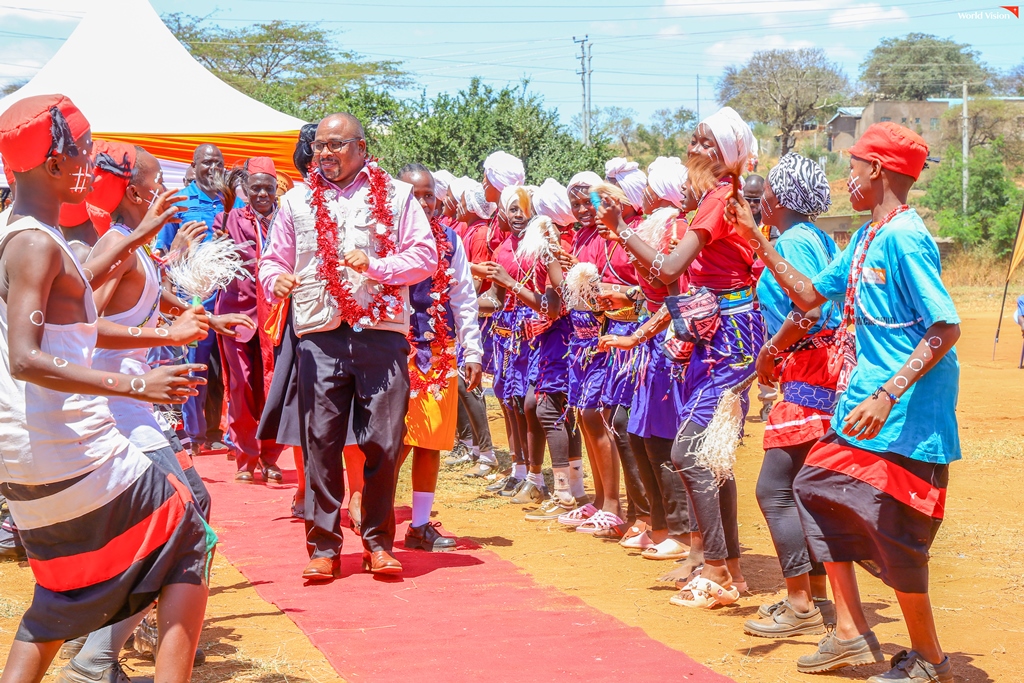More than 300 young people from Mwatate Sub-County, one of Taita Taveta County’s most drought-hit areas, have graduated from university after benefiting from a 15-year World Vision Kenya programme that expanded access to education.
The World Vision Kenya Mwatate Area Programme officially closed on Thursday, having invested USD 6.57 million in education, health, water, and child protection initiatives that benefited 35,700 children and families across Mwatate, Chawia, and Bura wards over the past 15 years.
The programme supported over 5,000 children through secondary education, with more than 300 graduating with bachelor’s degrees from Kenyan universities. Many others completed tertiary education programs, marking a record educational transformation in this Semi-arid region.
“Fifteen years ago, children in this area studied under trees because schools lacked proper classrooms,” said Caroline Aketch, World Vision Kenya Mwatate Cluster Manager, adding that “Today, we have engineers, teachers, and agriculturalists returning to serve their communities.”
The programme’s most striking achievement is in education transformation. Early childhood education enrollment has reached 71.6 per cent, up from below 20 per cent in 2010, while the milestone of university graduates was previously unheard of in this region.
When World Vision arrived in 2010, the area was facing severe educational challenges, including children at risk of abuse, high child protection incidents, weak reporting systems, and a lack of quality education infrastructure. Many children studied in dilapidated structures with leaking roofs and no furniture.
The programme equipped all 28 primary schools in the target area with modern infrastructure, including classrooms, libraries, computer labs and separate sanitation facilities for boys and girls, upgrades that directly benefited 9,789 learners.
The programme constructed 75 latrine blocks across 46 schools, eliminating open defecation and reducing waterborne diseases that previously caused high absenteeism rates. Additionally, over 30 water tanks were built in schools and handed over to management teams to ensure continued access to drinking water.
“So, as we transition today, we have put sustainability measures in place. We have established water committees that have been trained, and we are confident that they will effectively manage and maintain the water projects we have implemented. We have also worked closely with the school management board for all over 40, 30 cubic meters water tanks that we have constructed in schools.
Recognizing that poverty kept many children away from school, World Vison Kenya provided comprehensive support to vulnerable families. More than 5,500 children received school uniforms and bags, while 8,400 girls were given dignity kits containing sanitary products to prevent menstruation-related absenteeism.
READ ALSO:
School fee assistance reached over 3,000 children, with support extending from primary through secondary education and, in exceptional cases, to university level.
The programme also strengthened faith-based partnerships for child protection. World Vision enrolled 150 pastors at Scots University, with about 80 graduating with diplomas and 36 with certificates. These religious leaders now support communities in addressing cultural issues that contribute to child vulnerability.
A critical intervention was birth registration. Many children could not enroll in school or take national examinations due to lack of legal documentation. Mass birth registration drives increased adolescent birth certificate possession from below 50 percent in 2010 to 98.2 percent today.
As World Vision Kenya exits, robust sustainability measures ensure continued progress. All infrastructure has been officially handed over to school management committees and county education offices with detailed maintenance plans.
“As we leave, we plead that all the projects that we have implemented together with the government and the community that they shall be followed through to ensure that they continue serving the community for a long while. And we are not saying that we are leaving because all the problems in Mwatate have been solved. No, we are leaving because we have done what we had committed to do and promised to do,” said Gershon Mwakazi, World Vision Kenya Disaster Management Director.
The programme established community change groups to hold duty bearers accountable and ensure proper resource utilization for children’s benefit.
“We call upon other actors to continue working with the government to ensure that children are protected, children access clean water, children are educated for life and to make sure that resources that are either coming through the government or other actors are properly used for the intention that they were intended,” he added noting that, “That’s why we have had initiatives like community change, people whom we have trained to hold duty bearers accountable, to make sure that all the resources that are channeled in this county are properly used for the benefits of children and the community at large.”
By Michael Oduor
oduormichael2021@gmail.com
You can also follow our social media pages on Twitter: Education News KE and Facebook: Education News Newspaper for timely updates.
>>> Click here to stay up-to-date with trending regional stories
>>> Click here to read more informed opinions on the country’s education landscape






